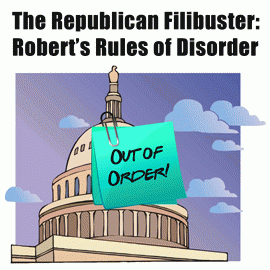(Article changed on January 20, 2013 at 12:48)
In the first three parts we reviewed how the founding fathers would never have agreed to a procedure requiring a supermajority to pass basic legislation (absent a presidential veto) or approve appointments. The first actual filibuster was not until at least 1837, and was immediately held in foul disrepute, and act of constitutional piracy.
Some may think that because Robert's so-called Rules of Order include a procedure that resembles an attempted cloture vote (to cut off a filibuster) that this was some time honored tradition from the same era as our Constitution. Nothing could be further from the truth.
Henry Martyn Robert was not one of our founding fathers. He was not even born until 1837, about the time filibusters were getting started. Robert was just a guy, an army colonel actually, who took it on himself in 1876, a hundred years after the Constitution, to put together a generic book of parliamentary procedures, for use by organizations NOT the government.
It is said that Robert imitated in part procedures in the House of Representatives at the time. If so, he just invented himself the idea of requiring a 2/3 vote to cut off debate, because unlike the Senate, the House at that time still maintained the procedure to "call the question" (and cut off debate) based on a simple majority vote. The Senate had no cloture rule at all at the time.
It was not until 1917 that the Senate finally acted to try to rein in filibuster abuse. President Wilson had proposed allowing merchant ships to arm themselves to protect against war time attacks on the high seas. Members of one party (we'll let you guess which one, it starts with "R" and ends with "Republican") filibustered for 23 days, while people burned them in effigy in the streets.
Finally, a cloture rule was negotiated, providing for a 2/3 vote to cut off debate, an unhappy coincidence with the Robert's generic procedure for small society actions, Robert's Rules of Disorder for running an actual government. But the key point is this. The only reason even that that compromise was possible was because the threat was to eliminate the filibuster entirely. It should have been done then. It must be done now. And the only way any positive change will happen is if that is what we are demanding.





